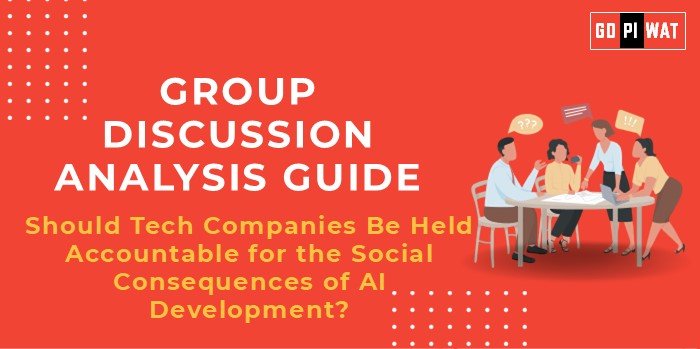📋 Group Discussion (GD) Analysis Guide: Should Tech Companies Be Held Accountable for the Social Consequences of AI Development?
🌐 Introduction to the Topic
- 📖 Opening Context: Artificial Intelligence (AI) is revolutionizing industries globally, from healthcare and education to finance and transportation. However, its rapid development has brought ethical and social dilemmas, raising the question of accountability for the societal impacts of its deployment.
- 🔍 Topic Background: The rise of AI, fueled by large-scale investments and research, has led to transformative applications. Yet, concerns over privacy violations, job displacement, bias, and misinformation have escalated globally. Major incidents, such as AI-driven misinformation campaigns and algorithmic biases in recruitment systems, highlight the need for responsible development.
📊 Quick Facts and Key Statistics
🌍 AI Global Market Value: Projected to reach $1.8 trillion by 2030 – indicates its transformative economic potential.
📉 Job Displacement: 85 million jobs could be displaced by AI by 2025 (WEF), raising socioeconomic concerns.
⚖️ AI Bias: Studies show AI tools are 60% more likely to discriminate against minorities in hiring.
📜 AI Ethics Initiatives: Over 50 countries have released AI ethical guidelines, reflecting the global concern.
💻 Tech Company Investments: Companies like Google and OpenAI spend billions annually on AI research.
📉 Job Displacement: 85 million jobs could be displaced by AI by 2025 (WEF), raising socioeconomic concerns.
⚖️ AI Bias: Studies show AI tools are 60% more likely to discriminate against minorities in hiring.
📜 AI Ethics Initiatives: Over 50 countries have released AI ethical guidelines, reflecting the global concern.
💻 Tech Company Investments: Companies like Google and OpenAI spend billions annually on AI research.
🤝 Stakeholders and Their Roles
- 🏛️ Tech Companies: Develop and deploy AI, responsible for ensuring ethical usage.
- 🌐 Governments: Regulate AI development and enforce accountability mechanisms.
- 📢 Civil Society: Advocate for ethical considerations and hold entities accountable.
- 📚 Academia and Researchers: Drive innovation while flagging ethical concerns.
- 👥 End Users: Directly impacted by AI applications, from individuals to businesses.
🏆 Achievements and Challenges
✨ Achievements
- ⚡ Enhanced Productivity: AI improves speed and accuracy across sectors.
- 💊 Breakthroughs in Healthcare: AI aids in disease diagnosis and personalized treatments.
- 🤖 Improved Customer Experiences: Through AI-driven personalization.
⚠️ Challenges
- ⚖️ Bias: Algorithms often perpetuate societal biases (e.g., COMPAS system in criminal justice).
- 🔒 Privacy Violations: Data misuse for training AI models.
- 📉 Unemployment: Large-scale automation threatening traditional jobs.
🌍 Global Comparisons
- 🇪🇺 EU: Leads with its AI Act to enforce ethical standards.
- 🇺🇸 US: Focuses more on innovation and market-driven AI advancements.
🗨️ Structured Arguments for Discussion
- 👍 Supporting Stance: “Tech companies hold the expertise and resources to prevent and mitigate AI’s societal harms, thus they must be accountable.”
- 👎 Opposing Stance: “Placing all accountability on tech companies stifles innovation and ignores the role of governments and users.”
- ⚖️ Balanced Perspective: “Accountability must be shared among tech companies, regulators, and society for sustainable AI development.”
💡 Effective Discussion Approaches
- 📊 Opening Approaches:
- Statistical: “85 million jobs are at risk of being displaced by AI—should tech companies bear the responsibility?”
- Case Study: “Instances of biased AI tools in recruitment emphasize the urgent need for accountability.”
- 💬 Counter-Argument Handling:
- Acknowledge: “While innovation may slow with stricter accountability, societal impacts warrant priority.”
- Reframe: “Accountability can coexist with innovation through collaborative frameworks.”
🔍 Strategic Analysis of Strengths and Weaknesses
- 💪 Strengths: Advanced AI ethics frameworks emerging globally.
- 💔 Weaknesses: Inconsistent enforcement of accountability laws.
- 🚀 Opportunities: Public-private partnerships to ensure ethical AI.
- ⚡ Threats: Widening socio-economic inequalities.
🎓 Connecting with B-School Applications
- 📘 Real-World Applications: AI in business management, marketing analytics, and HR recruitment.
- 🗨️ Sample Interview Questions:
- “How should businesses balance innovation with ethical AI usage?”
- “Discuss a scenario where AI accountability played a key role.”
- 📖 Insights for B-School Students:
- Incorporate ethical frameworks in business decision-making.
- Recognize the socio-economic ripple effects of AI-driven transformations.


